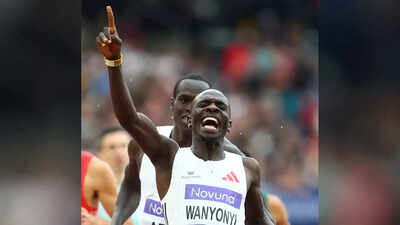ARTICLE AD BOX

Emmanuel Wanyonyi (image credit: World Athletics)
MUMBAI: There’s a picture of Emmanuel Wanyonyi from an interview with BBC Sport Africa published last Nov where he is seen tending to his cattle in his small village in western Kenya.
It’s a reminder of his humble beginnings, of a boy forced to drop out of school at just 10 as his family couldn't afford exam fees, who went on to become an Olympic champion.At the Paris Olympics last year, Wanyonyi, only 20, edged past his Canadian rival and ‘good friend’ Marco Arop, the reigning world champion, to win the men’s 800m final. It made the Kenyan the youngest ever winner of the event in Olympic history.
Go Beyond The Boundary with our YouTube channel. SUBSCRIBE NOW!
But as he crossed the line and the reality of what he had just accomplished began to strike him, there was one person he dearly missed.“As I crossed the line and realised I’m the winner, I then thought ‘why is my father not alive? I needed my father to see this race. I needed my father to be there’,” Wanyonyi recalls during a call with reporters on Tuesday.Neither he nor his family ever got to know what really happened to his father who died suddenly in 2019. In the interview with BBC, he says his father, who worked as a caretaker at a dam, had just dropped by his school to hand him some money to buy running shoes.
“It’s like he was strangled and placed by the water,” Wanyonyi said.Being one of 11 children, there was little time to grieve. In Wanyonyi’s own words, “I had to become the man of the house immediately.”From putting in long hours tending to cattle, to taking up other odd jobs where he didn’t even get paid at times, the youngster managed to return to school and would soon catch the eye with his running ability. With his father’s tragic death providing the inspiration for him to take up running seriously, track and field would ultimately lead Wanyonyi to the finest moment any athlete could hope to experience, at last year’s Summer Games in Paris.
More importantly perhaps, it has also helped him become a pillar of support for his family financially.“Maybe these challenges I faced before was God’s way of preparing me mentally to come to be a champion one day,” is how he looks at his journey now. The money he has earned from his track exploits, he points out, only came in after overcoming “these challenges”.“I started to run because I come from a poor background. I’d say to myself, I need to run, I need to be a champion because I need to help my family.
Because all in all, I need money. I need money to help my siblings, my mother. That’s why I’m pushed to run every day,” he says.With the world championships coming up next month in Tokyo, Wanyonyi’s first target will be to try and go one better than the silver medal he bagged at the last edition in Budapest. However, with his personal best (1:41.11) placing him alongside Wilson Kipketer at second place in the all-time 800 metre list, is David Rudisha’s world record (1:40.91), which has stood since the 2012 London Games, also on his mind?“I got some time to speak to him (Rudisha) one day. He told me you are close (to breaking) this world record.
But I say there is time for everything. I’m still young, I’m still focused. Maybe one day I can break this world record,” says the 21-year-old, making his respect for his distinguished retired compatriot clear.“I need to respect Rudisha, because Rudisha has run 1:42 or lower many times. So maybe I can try to run my personal best because this race is very complicated for me.”The rivalry with Arop, whom he finished second best to in Budapest, is one Wanyonyi thoroughly enjoys.
According to him, the 26-year-old Canadian’s greater experience over the distance is what made the difference that day, in a competition the Kenyan hadn’t featured in before. It was an experience Wanyonyi learnt from and which helped him turn the rivalry in his favour.“Marco is someone I respect a lot, but in Budapest, I can say he beat me because of experience. I was in good shape, I had energy, of course I didn’t have any experience for the world championship.“Then after Budapest, I say, ‘let me continue to learn how to run 800 metres’, I beat Marco two times. I beat him in China in Xiamen and then at the Diamond League finals in Eugene. So I learned a lot, but right now I’m still learning. 800 metres, maybe you can be in good shape, but if you don’t have experience for 800 metres, maybe you can lose,” he says.



.png)
.png)
.png)
















 23 hours ago
9
23 hours ago
9









 English (US) ·
English (US) ·